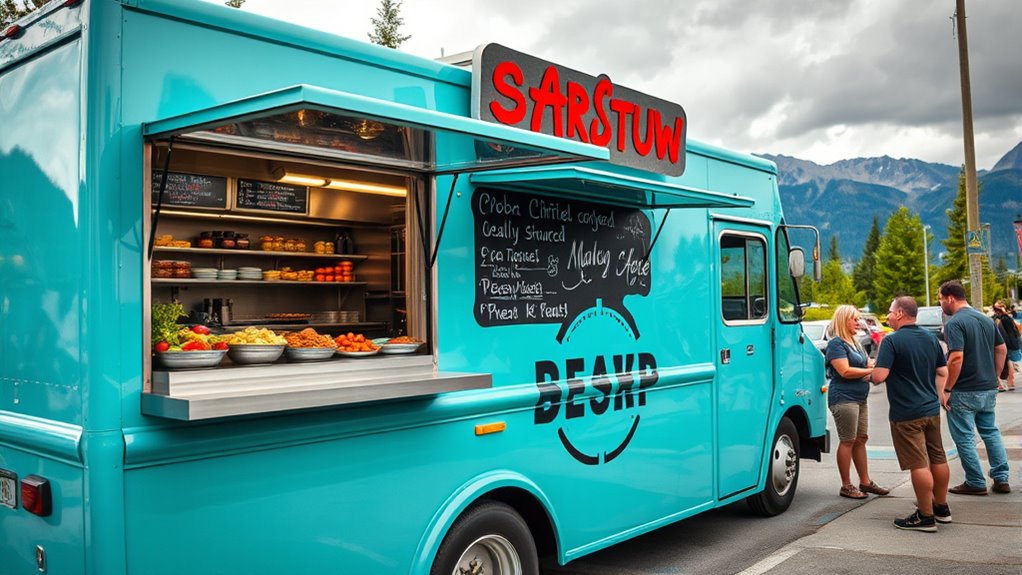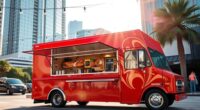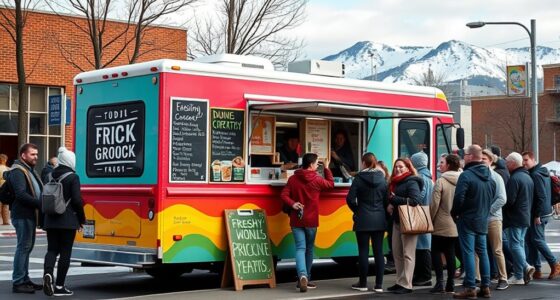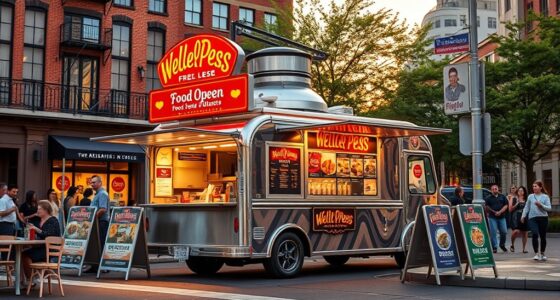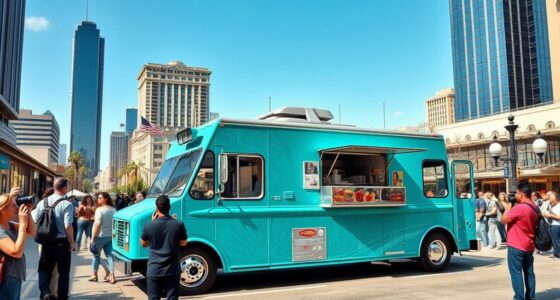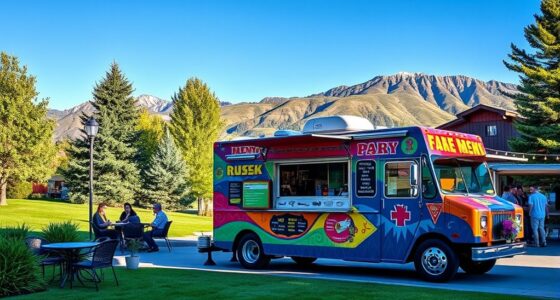To open a food truck in Juneau, you’ll need permits from the Alaska DEC, including a Food Establishment or Temporary Food Service Permit, which requires a menu and safety plans. Expect costs between $40,000 and $120,000 for your vehicle, plus permit fees around $70 per day. Choose vending zones carefully, follow food safety regulations, and use marketing tools like social media and local events to attract customers. For detailed steps and tips, keep exploring these essentials.
Key Takeaways
- Obtain necessary permits from Alaska DEC, including food establishment and zoning approvals, at least one week before opening.
- Budget for vehicle costs ($40,000–$120,000), permits (~$70–$825 annually), and marketing ($3,000–$8,000).
- Choose vending locations within designated zones, ensuring sidewalk space, minimum distances from entrances, and compliance with street restrictions.
- Submit detailed menus and HACCP plans, adhering to food safety standards and proper handling to ensure health compliance.
- Promote your food truck via social media, participate in local events, and use digital tools to attract customers and build loyalty.
Navigating Permits and Licensing Requirements
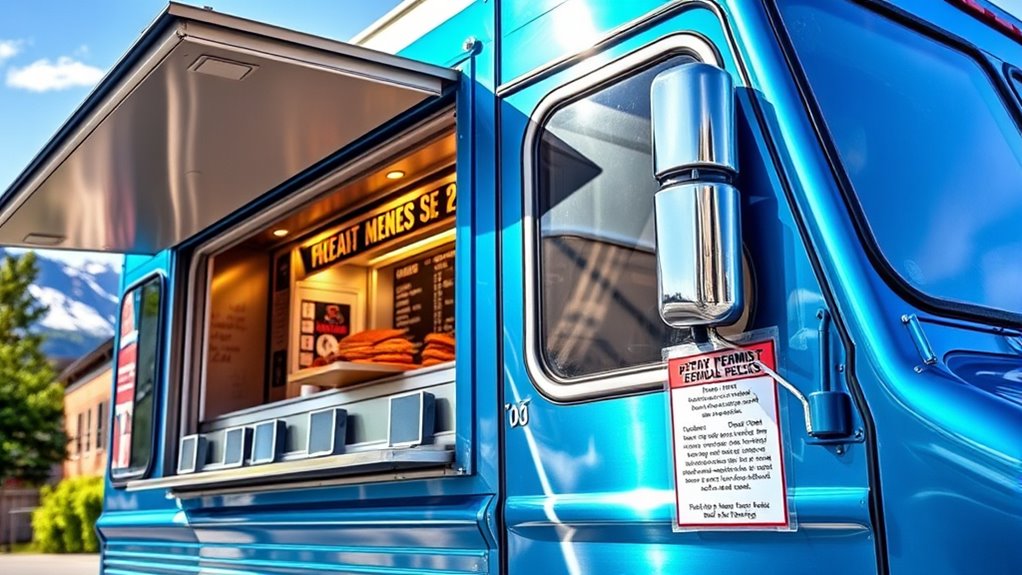
To legally operate a food truck in Juneau, Alaska, you need to navigate a series of permits and licensing requirements. First, obtain a Food Establishment Permit or Temporary Food Service Permit from the Alaska Department of Environmental Conservation (DEC). Make sure to submit your complete vending permit application at least one week before your planned opening—any incomplete applications will be rejected. Be prepared to include your food menu and, if necessary, a Hazard Analysis Critical Control Point (HACCP) plan. You’ll also need proof of approval from departments like water, wastewater, fire safety, plumbing, zoning, and building authorities. For events outside your truck, temporary permits may be required. Staying compliant guarantees smooth operations and avoids legal issues. Support for online application submissions has improved in recent years, making the process more accessible for vendors. Additionally, understanding food safety regulations is essential to ensure your operation meets all health standards and protects your customers.
Estimating Costs and Managing Fees
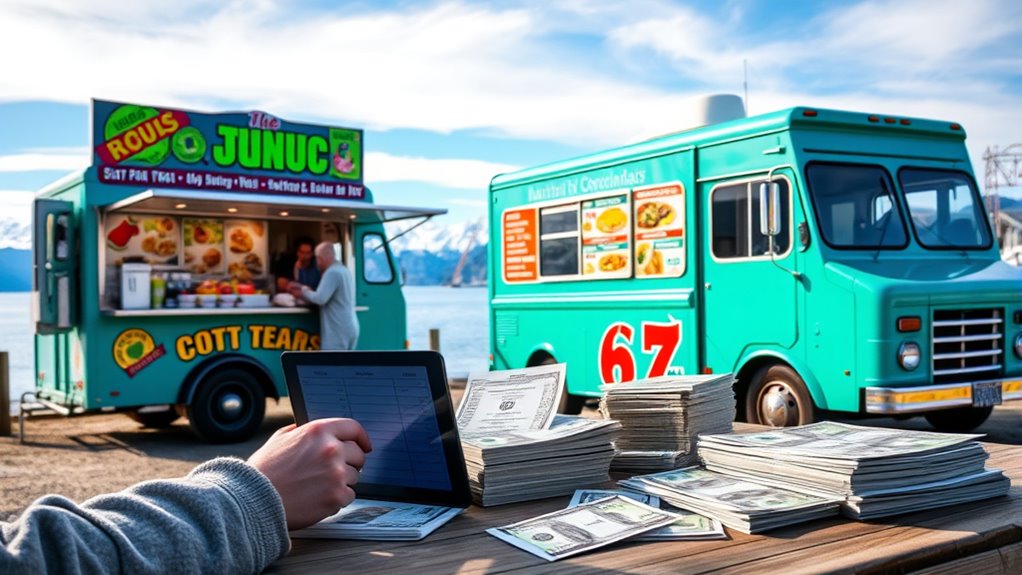
Estimating costs and managing fees are essential steps in launching your food truck business in Juneau. You’ll need to budget for vehicle costs, permits, and daily expenses. For example, vehicle costs vary from $40,000 to $120,000, depending on condition. Permit fees include $70 for the first vending day, plus $20 each additional day, while marine park permits can cost $1,250 monthly per site. Use this table to visualize your costs:
| Item | Cost Range | Notes |
|---|---|---|
| Food Truck/Trailer | $40,000 – $120,000 | Based on condition and equipment |
| Permits & Licensing | $580 – $825 annually | Plus additional site fees |
| Marketing Budget | $3,000 – $8,000 | For brand awareness and promotions |
| Operating Expenses | Monthly variable costs | Fuel, inventory, wages, utilities |
Additionally, understanding the 16PF personality traits of potential team members can help ensure a cohesive and effective team dynamic.
Choosing Approved Vending Locations and Zones
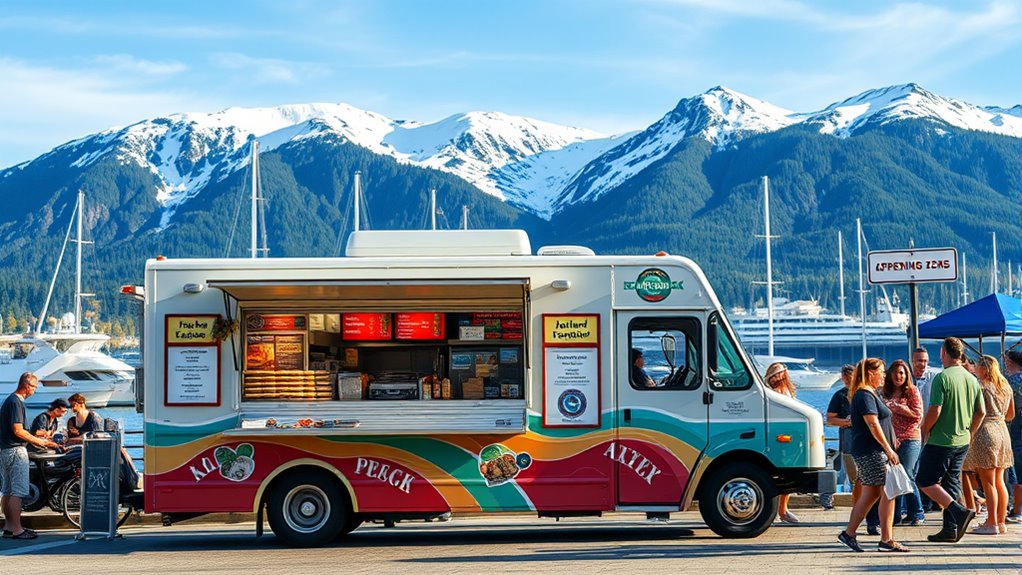
Choosing the right vending locations is essential for your food truck’s success in Juneau, as you must operate within designated zones set by the City and Borough. Downtown Juneau offers specific sidewalk vending spaces, available on a first-come, first-served basis starting October 1. Your vending spot must allow at least five feet of unobstructed pedestrian sidewalk space, and vending is limited to about 20 square feet per area, which must be easily movable by one person. You can’t operate on sidewalks less than 12 feet wide or on streets with restrictions. Additionally, you need to comply with regulations like maintaining minimum distances from building entrances, transit stops, and public places, ensuring your vending unit is positioned correctly along the street edge. Vending zones are periodically reviewed and updated by city officials to accommodate changing pedestrian and traffic patterns, so staying informed about current zone designations is crucial for compliance.
Planning Menus and Ensuring Food Safety Compliance
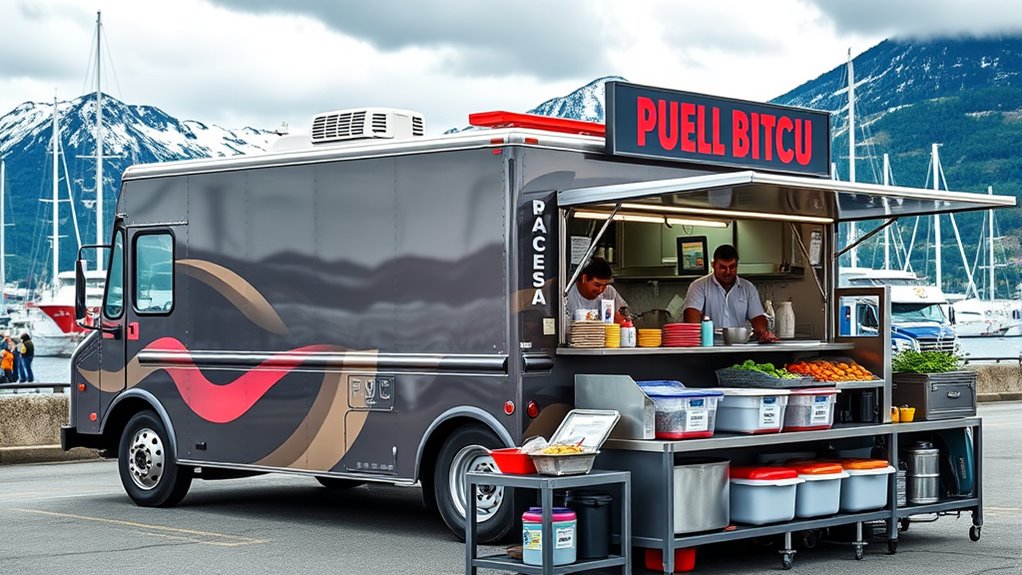
Effective menu planning is essential for your food truck’s success in Juneau, as it must meet specific regulatory requirements and accommodate your equipment and operational limitations. You need to submit your menu with the Food Establishment Application to the Alaska DEC, ensuring all items are clearly listed. If your menu includes smoking, curing, acidifying, dehydrating, or vacuum packing, a HACCP plan is required. To stay compliant, focus on these key steps:
- Design your menu considering your truck’s equipment and size restrictions, avoiding prohibited items like shellfish or wild game.
- Maintain proper documentation and submit necessary plans, including HACCP if applicable.
- Follow safe food handling, storage, and sanitation practices, ensuring all staff are trained and procedures are documented for inspections.
- Incorporate proper temperature control to ensure food safety and prevent contamination during preparation and storage.
Effective Marketing Strategies for Your Food Truck
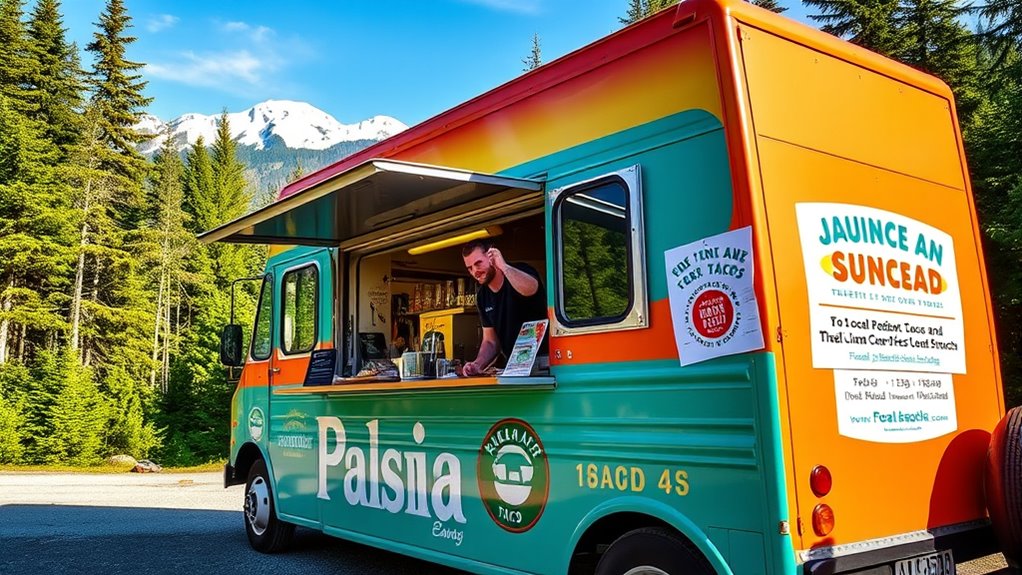
To stand out in Juneau’s competitive food truck scene, leveraging strategic marketing is essential. You should prioritize social media, with platforms like Facebook where 75% of food trucks actively promote themselves. Social media campaigns can boost your sales by 20% and encourage customers to spend about 15% more at your truck. Participating in local events and festivals—around 80% of trucks do this—helps increase visibility and attract new customers. Building customer loyalty through programs and email marketing, used by over half of food trucks, can lift repeat visits by 30%. Additionally, utilizing GPS tracking apps and location-based marketing tools enhances customer discovery and foot traffic. Analyzing your target demographic and engaging with nearby audiences guarantees your marketing efforts reach the right people for sustained success. Market size and industry growth statistics also show that a strong digital presence and strategic branding can significantly improve customer trust and loyalty.
Frequently Asked Questions
How Long Does the Permit Approval Process Typically Take in Juneau?
The current question about permit approval times in Juneau depends on several steps. You’ll need to submit your plan review at least 30 days in advance, then wait for the department’s review and approval. Inspections, insurance verification, and any needed corrections can extend this timeline. Typically, you should expect the process to take around one to several weeks, but it can be longer if there are delays or additional permits needed.
Are There Specific Vehicle Size Restrictions for Mobile Food Units in Juneau?
Think of vehicle size restrictions in Juneau like a tightrope walk—you need balance. Your food truck must be no longer than 45 feet for power vehicles and 53 feet if towing a trailer, with a combined length under 75 feet. Height can’t exceed 14 feet, and overhangs are limited. These rules guarantee your mobile unit stays road-legal, so plan your size carefully to stay on the right side of the law.
Can I Operate a Food Truck on Private Property Without City Permits?
You wonder if you can run a food truck on private property without city permits. While operating solely on private property might seem simpler, you still need to follow state health regulations, obtain proper permits, and meet food safety standards. You also need written permission from the property owner. Even then, zoning rules and local health laws apply, so it’s best to verify with local authorities to ensure full compliance.
What Are the Most Common Reasons for Permit Application Rejections?
Imagine your dreams slipping through your fingers like sand. Permit rejection often feels that way, and it’s usually because you missed a key piece of the puzzle. You might have left out essential forms, proof of licenses, or insurance. Or perhaps your mobile unit doesn’t meet safety codes. Deadlines and proper documentation are your safety net—without them, your permit application can be denied, halting your journey before it begins.
How Do I Handle Permit Renewals and Ongoing Compliance Requirements?
To handle permit renewals and ongoing compliance, you need to stay organized. Log into the DEC online portal with your business code, submit your renewal, and pay fees before the deadline. Keep current food worker cards, liability insurance, and health certifications updated. Maintain detailed records of permits, inspections, and correspondence. Regularly review health and safety standards, and promptly notify authorities about any changes to avoid lapses or penalties.
Conclusion
Starting a food truck in Juneau can be rewarding if you navigate permits, costs, and locations carefully. While some believe food trucks thrive solely on foot traffic, studies suggest strategic marketing and menu innovation play bigger roles. By staying compliant and creatively engaging your audience, you increase your chances of success. Remember, blending local flavors with effective branding can turn your truck into a must-visit spot, making your venture not just feasible but truly memorable.
